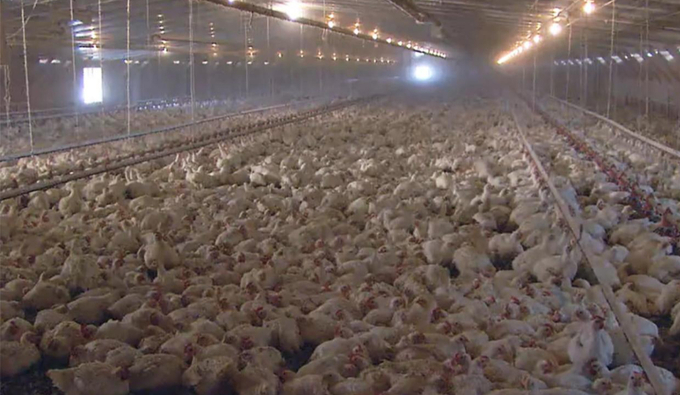June 17, 2025 | 19:52 GMT +7
June 17, 2025 | 19:52 GMT +7
Hotline: 0913.378.918
June 17, 2025 | 19:52 GMT +7
Hotline: 0913.378.918

Photoo: CBS News.
Their graves overlook the farm that's been in the family since the 1640s. Some family members' tombstones are adorned with ducks. "I'm gonna say it was my grandfather's idea, because he did it first," said Doug Corwin.
It was Corwin's great-grandfather who started raising ducks in 1908, when Long Island was famous for its duck farms. Now, Crescent Duck Farm is the only one left. It produced a million ducks a year, until two weeks ago, when bird flu shut the farm down. Corwin said, "I saw a flock one day that was great, and the next day was lethargic, wasn't eating. It looked like something I'd never seen before."
Dozens of state and local agricultural workers, dressed in biohazard suits, assisted in the euthanasia of the entire flock – 100,000 ducks. Whether it's ducks or chickens, since the current strain of bird flu, H5N1, reached the United States in 2022, over 148 million birds have been ordered euthanized.
"It's a staggering number, there is no doubt," said Jodie Guest, a professor of epidemiology with Emory University's Rollins School of Public Health in Atlanta. "But it is, and always has been a policy across administrations, with the USDA, that this is how they handle infections like this among poultry. And as we've seen bird flu move [across] species, it becomes even more important to try to contain that infection in the flocks that it's in, so that we don't continue to see spread."
Except that's exactly what has happened. H5N1, Guest said, was in all 50 states by the end of 2023, transmitted by wild birds through their feces and saliva. "So, in 2024 we saw bird flu jump from our poultry and wild birds, to mammals, to cows. And that was a very startling change," she said.
Until 2024, there was only one human case in the U.S. In just a few months, the number jumped to 67, with one death. Most of those cases were workers at dairy operations and poultry farms. They experienced mild symptoms.
Guest said, "So far, we've not seen human-to-human transmission, and that would have to happen in order for us to be on the verge of an epidemic or a pandemic." She added, however, that she is not scared of that happening: "I feel very strongly that human risk is still very, very low."
But the spread of H5N1 is not being contained … and look what culling has already done to the price and availability of eggs.
The issue has become politicized. Last week, White House press secretary Karoline Leavitt said, "The Biden administration and the Department of Agriculture directed the mass killing of more than 100 million chickens, which has led to a lack of chicken supply in this country, therefore lack of egg supply, which is leading to a shortage." In fact, the last Trump administration followed the same policy.
Doug Corwin says, "A vaccine program is the only thing that's gonna get us out of this."
The proposal is controversial: allow poultry farmers to vaccinate their birds against H5N1, something theoretically doable but currently forbidden, because it would cripple U.S. poultry exports to the many countries which ban vaccinated birds. "The disease is becoming much bigger than the export situation, because the disease is so getting out of hand right now," Corwin said.
Corwin can't decide which is worse: losing 100,000 ducks, or having to lay off 48 people.
I said, "You seem ambivalent about whether or not you even want to try again?"
"Martha, think about what I've been through over the last two weeks," Corwin replied. "It's devastating, utterly devastating. It reminds me of losing both of my parents, that sudden ... that grief. It's just that feeling like you've lost something that's part of you."
AOL

(VAN) Extensive licensing requirements raise concerns about intellectual property theft.

(VAN) As of Friday, a salmonella outbreak linked to a California egg producer had sickened at least 79 people. Of the infected people, 21 hospitalizations were reported, U.S. health officials said.

(VAN) With the war ongoing, many Ukrainian farmers and rural farming families face limited access to their land due to mines and lack the financial resources to purchase needed agricultural inputs.

(VAN) Vikas Rambal has quietly built a $5 billion business empire in manufacturing, property and solar, and catapulted onto the Rich List.

(VAN) Available cropland now at less than five percent, according to latest geospatial assessment from FAO and UNOSAT.

(VAN) Alt Carbon has raised $12 million in a seed round as it plans to scale its carbon dioxide removal work in the South Asian nation.

(VAN) Attempts to bring down the price of the Japanese staple have had little effect amid a cost-of-living crisis.